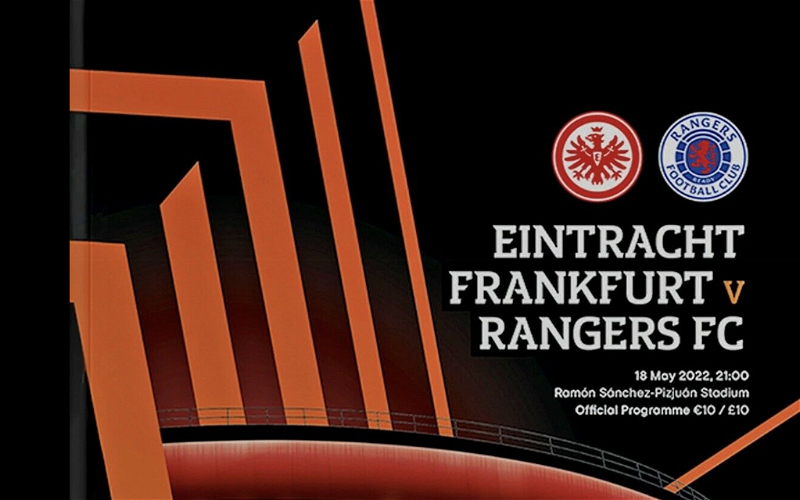By Johnny Bluet
After coming sooo close to winning a second European honour in Spain, I felt it imperative our club, Rangers FC, or at least the men’s first team, should have something to show for a season after which it contested a staggering sixty-five competitive fixtures. Of these games, players selected to represent the club won forty-two, lost eleven and drew twelve during which one hundred and twenty-nine goals were scored and fifty-four conceded (not including the goals scored for and against in THE penalty shootout). Of course, it’d be perfectly reasonable to claim Rangers lost ten as opposed to eleven games on account of the most important fixture, UEFA’s Europa League final, being drawn at the end of open play.
And so to finish a week when many Rangers supporters transported themselves off to Seville and back (and, aye, that’s another story!), we found ourselves returning to Hampden exactly five years to the day after a Scottish Cup capitulation to Hibernian.
One of my abiding memories from that day is of James Tavernier and Rob Kiernan retreating while Anthony Stokes ran at them and found enough space to fire our opponents from Leith into a third-minute lead. Red carpets and invitations weren’t evident during the process, but in hindsight they may as well have been. That passage of play, I felt, set the scene for what was about to unfold on that fateful afternoon.
Fortunately, five years on, no such passage of play thwarted James Tavernier lifting Scottish football’s oldest piece of silverware. Two well-executed goals scored by former Aberdeen players, Ryan Jack and Scott Wright, in the first-half of extra-time made the difference and I stuck around Hampden, our so-called national stadium, to milk the occasion for all it was worth. A thirteen-year hiatus had, thankfully, come to an end against another club from Scotland’s capital city, Heart of Midlothian. There was to be no post-match repeat of the shameful scenes witnessed five years earlier. Both sets of supporters restrained themselves enough so as not to involve retrospective law enforcement via CCTV and documented film footage.
Despairingly, the same can’t be said of football supporters south of the border. On BBC One’s ‘Match of the Day’ following the English Premier League’s final round of fixtures, Messrs Lineker, Shearer and Wright adopted a sombre tone to briefly mention a pitch incursion by spectators following Manchester City’s victory over Aston Villa. They condemned the assault(s) on Aston Villa’s Swedish goalkeeper, Robin Olsen, after the final whistle. Wright said something about the field of play being a professional footballer’s place of work – inferring, I think, that no one should be subjected to physical violence while at their employment. Too true, I thought in agreement. All three agreed something had to be done, but collectively could offer no solution to what is an age-old problem. The reappearance of perimeter fences post-Hillsborough, they correctly affirmed, should not be a consideration for the authorities (…whoever they may be).
And therein lies the real problem… Who is accountable for taking responsibility? Should it be the football authorities or is it the responsibility, which I think it is, of elected politicians and legislators (i.e. national governments)?
While I understand football authorities’ reluctance to allow governments to become involved, or interfere as they might see it, in affairs which they consider their domain, I contend the issue of pitch invasions by spectators at senior football grounds to be a matter of legislation and law enforcement as laid down by governments.
When, on Saturday 21st May 2016, large numbers of Hibernian supporters decided to invade the Hampden pitch to express what some journalists called “exuberance”, I stood in the South Stand Lower thinking about the post-Hillsborough decision to abolish perimeter fencing and a particular scene from the film, ‘A Sense of Freedom’ (1981). The scene I was thinking of features the lead actor, David Hayman, playing Jimmy Boyle, being handed a knife by a prison officer to cut a tenacious piece of string from a package addressed to him. After all the violence which preceded and prompted a different approach from the relevant authorities, Boyle was subjected to a rehabilitation process which eventually bestowed certain responsibilities on him. By offering Boyle the knife to cut the string, the prison officer was effectively entrusting him not to abuse the opportunity and consequently his responsibility.
Perimeter fencing at football grounds is a barbaric and crude way to prevent pitch incursions by the sport’s spectators. In the case of Hillsborough, which should never be forgotten, it was disastrously fatal.
After Hillsborough, I wondered, why any football supporter in their right mind would wish to provide the authorities with ammunition to re-erect perimeter fencing around pitches at senior football grounds?
Whenever it happens, unless there are exceptional circumstances as there certainly were at Hillsborough, no excuses can be made for anyone other than authorised personnel being present in designated areas on or close to the field of play. The issue is one of public order and should not be left in the hands of the relevant football authorities. In my humble opinion, anyone venturing onto the field of play without good reason should be fined a statutory £1000 and it should be administered robustly, and retrospectively when necessary, by law legislators and enforcement agencies as directed by national governments.
NO MORE FAFFING AROUND UNTIL SOMEONE IS SERIOUSLY HURT!




